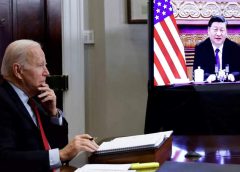
taiwan: Pelosi’s Taipei visit has hastened the pace of US-China decoupling — bad news for the world
[ad_1]
If intensified, the tremors of economic decoupling will be felt across world markets, and Indian businesses will suffer serious harm. Already, China has suspended regular communication channels with the US military. It has also suspended climate talks with the US, which would be disastrous because the two countries are the world’s worst polluters.
It will hit both the US and Chinese businesses causing havoc in some sectors and on the balance sheets of hundreds of companies from the two countries. The number of US companies that regard China either as its main production centre or the biggest market runs into the hundreds. Qualcomm generates 65% of its revenue from China, Broadcom 51%, Texas Instruments 44%, General Motors 38% (measured in unit sales), Intel 28%, Corning 22%, and Starbucks and Apple 20% each.
Industry lobbying organisations have their own concerns. The American Chamber of Commerce in China (AmCham China) has said that 62% of its member companies have ranked China as one of the three most important markets. The US-China Business Council has said that 82% of its members have cited China as one of the top five markets. Beijing has set into motion a plan to invest heavily in R&D, and reduce China’s dependence on the US after the launch of the trade war in 2018. This process will get a huge boost and China will try every means in the book and outside to reduce its on US imports and also its own exports to the US.
Packing in Europe?
It is expected to focus more on Europe and do what it can to persuade the EU not to go the US way. China will also look for alternative markets, including Vietnam and India, if GoI permits the latter. American businesses located in China are worried about a Chinese backlash against them if the US goes ahead with its plans to censure more Chinese companies. There are signs that some American companies that depend on the Chinese market for survival, might ‘de-Americanise’ themselves by shifting their headquarters to Singapore or elsewhere.
In July, western holdings of Chinese financial assets reportedly amounted to $1.1 trillion. China recently announced a swap contract opening up its $3.1 trillion swap market to foreign players. Simply put, the stakes are mindboggling for both manufacturing and financial sectors in the US and China, and thousands of companies in other countries, including India who feed on their business.
But the US is already showing signs it will restrict Chinese business on its soil in a big way. It is expected to take forward its plans to cut off several Chinese companies from the American market and even delist the 150-odd Chinese firms listed on the New York Stock Exchange (NSE) and the Nasdaq. A 2020 law allows the US Securities and Exchange Commission (SEC) to delist foreign companies that fail an audit test about their transparency. The implementation of this law had slowed owing to negotiations with Chinese authorities. But SEC chairman Gary Gensler recently expressed doubts that the delisting process would be halted.
Nancy Vs Joe
What is ironic is that the move comes from a US leader who is not part of Joe Biden’s administration, and at a time when the president himself hinted at plans to roll back some of the economic sanctions the US imposed on China. Biden is busy fighting the monster of inflation, and increasing the flow of low-cost Chinese goods may soften its bite a little.
An important question is how earnestly Biden will follow up on the outcome of Pelosi’s visit, which includes an assurance from her that the US will ‘not abandon Taiwan’ in the face of threats from China. The president can hardly pretend that the visit by the second biggest leader in the country did not happen with the entire US Congress and the world watching. Biden will be politically finished if even a handful of Democrat politicians say that he is soft towards China. What Pelosi has done is intensified an anti-China fever in the US, and in other countries like Japan. There is no going back for Biden. More so, because China’s military exercises involving jet fighters and ballistic missiles in the seas around Taiwan appear more threatening with every passing hour.
A big question is whether the Biden administration would give some signal that it is ready to militarily respond in case a part of Taiwan, or Japan, is hit. Japan has already complained that five Chinese missiles have landed in its exclusive economic zone off the Japanese coast. Either way, we live in interesting times.
[ad_2]
Source link


